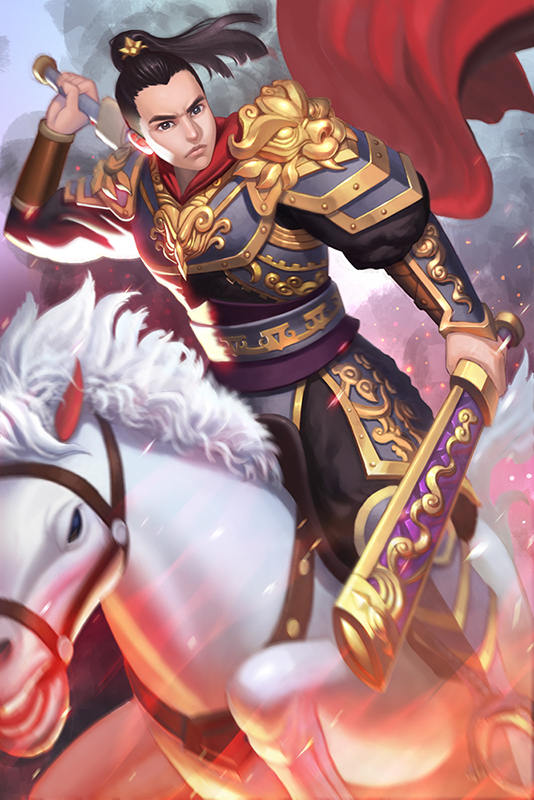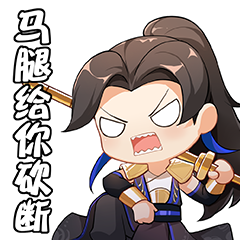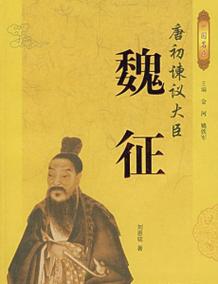We all know that the Tang Dynasty in China was an economically developed dynasty, and its economy reached its peak at that time. Therefore, the Tang Dynasty’s Tang poetry also promoted the development of its economy. Today, let’s take a look at a poet from the Tang Dynasty, who is Lu Lun. Generally, poets write poetry to express their thoughts and emotions, and to express their beautiful wishes. All scenery and language are emotions that speak to this end. At that time, Lu Lun’s life was full of ups and downs, and although he had become an official, his time was not long. Let’s take a look at the story of the frontier poet Lu Lun today!

Lu Lun was so dissatisfied throughout his life, only because of the recommendation of the powerful, he became an official for a short period of time, which can be said to have benefited from social interaction. Lu Lun had dealings with many powerful and influential figures. In addition to the prime ministers Yuan Zai and Wang Jin mentioned earlier, other prime ministers who had held actual positions included Chang Gun, Li Mian, Qi Ying, Lu Zan, Jia Dan, Pei Jun, and Linghu Chu. Although Hun (Wang Xian), Ma Sui, and Wei Gao had never served as prime ministers, they were also powerful figures.
Lu Lun’s poetry is mainly composed of five or seven character close form poems, often sung and given as gifts. But the poems he wrote during his military life, such as “The Song of the Frontier”, have a powerful style and generous sentiment, and have always been passed down. When he was young, he lived in various places to avoid chaos and had some exposure to reality. Some of his poems also reflected the poverty of people’s lives and the depression of the social economy after the war, such as “Meeting the Sick Old Man in the South of the Village”. Other works, such as the seven character quatrain “Late Visit to Ezhou” written earlier, depict the feelings and experiences of staying at night during the journey to the south to avoid safety and historical chaos, which is real, vivid, and deeply emotional. The seven character song line “On the twelfth day, watching the Xianning King’s Song of Capturing Tigers” depicts the battle between a brave warrior and a fierce tiger, which is thrilling and full of vitality. In the Qing Dynasty, Guan Shiming wrote in his book “Reading Tang Poems and Notes from Xueshan House”: “Among the scholars of the Great Calendar who were both experts in the seven character ancient period, Lu Lun and Han □ can be compared to Mo Jie (Wang Wei) and Dongchuan (Li Qi), and can be called specific
There are currently 10 volumes of the “Lu Hubu Poetry Collection”, which are included in the “Complete Works of One Hundred Famous Tang Poetry Masters”. There are also three volumes of the Ming Zhengde edition of the “Lu Lun Poetry Collection”, which includes ten volumes and five lost poems from the “Complete Tang Poems”. The Complete Tang Poems compile his poems into 5 volumes. The deeds can be found in the “Biography of Lu Jian Ci” in the “Old Book of Tang” and the “Literary and Artistic Biography” in the “New Book of Tang”.

Lu Lun, who was crowned as one of the top ten talented scholars in the Tang Dynasty’s Dali era, was renowned for his poetry, but failed numerous attempts. His life and career were extremely difficult, but his extensive social circle made him an active socialite, and he eventually entered the officialdom through this.
Year of Birth and Death Exam
Lu Lun’s birth year is generally referred to as the seventh year of the Tianbao reign of Emperor Xuanzong of Tang Dynasty (748 AD) in reference books, and is designated as the seventh year of the Tianbao reign by You Guo’en and others in their book “History of Chinese Literature”. Both are based on Mr. Wen Yiduo’s “The Great Series of Tang Poetry” and seem to have become established theories. But Mr. Fu Xuancong’s “A Study of Tang Dynasty Poets” believes that the 748 year theory cannot be established, because Yao He’s “Jixuan Collection” and “Old Book of Tang: Biography of Lu Jian Ci” record that Lu Lun Tianbao did not pass the imperial examination and became a jinshi. The records of the Tang and Five Dynasties are reliable. If he was born in the seventh year of Tianbao (748 AD), Tianbao was only an eight or nine year old child and could not have passed the imperial examination. Lu Lun wrote several poems that were attributed to Zhi Dezhong. If he was born in 748, Zhi Dezhong would only be around ten years old and would not have written these poems. Fu said it makes more sense. Wen Yiduo and You Guo’en did not provide any evidence, so Fu Shuo should be taken as the basis. Fu Xuancong proposed that Lu Lun’s birth year could never have been 748, but should have been significantly earlier, born in the 25th year of the Kaiyuan era (737 AD) or a few years earlier. As for the year of Lu Lun’s death, it is generally recorded in reference books as around 800 years, which is the 16th year of the Zhenyuan era, and it is also unreliable. According to the detailed research in Fu Xuancong’s book, Lu Lun passed away in the 14th and 15th years of the Zhenyuan era, between 798 and 799.
3 Junior Imperial Examinations
During his youth, Lu Lun’s family was not very well-off and the world was not peaceful. His father may have passed away earlier, and he himself was also sickly, so his life was not good. He may have spent a lot of time at his uncle’s house. In his poem “Lun and Ji Shilang, Zhongfu Sikong Langzhong, Shumiao Yuanwai, Cuibu Que Dong”, he claimed: “At the age of eight, I started studying, and there were soldiers in all directions… I am blessed with a solitary and humble life, rarely born of illness.” He also wrote in his poem “Go to Chizhou to pay respects to my uncle and stay with me for the examination of my achievements, Langzhong Uncle”: “Being solitary and humble is easy to waste time, just like what it looks like. There are few descendants of the same clan, but many grow up in other countries. Mulberry and elm trees from other countries are here, stained with clothes, blood, tears, and harmony. We should pity the lost geese, and send smoke waves with frost and hail
After a few years, Lu Lun’s journey towards the imperial examination was not smooth. The previous text mentioned that both the “Jixuan Collection” and the “Old Book of Tang” recorded that Lu Lun Tianbao did not pass the imperial examination at the end. Lu Lun wrote a poem called “Returning to the South after Falling in the Palace”, which goes: “After a long period of time, my name has been lost, and I return to the mountains at the end of spring. I am ashamed to speak of my fate, and my face is ruined when I meet someone.” In “Lun and Ji Shilang Zhongfu…”, it is said: “Fang Fengsu is compared to gold, but I have not recognized the officials and ministers. I cannot wait for ten years, and I have not achieved anything in three years.” From these poems, it can be seen that Lu Lun Tianbao lived and studied in Zhongnan Mountain before falling in the Palace, and he applied several times, but failed to pass. Later, he sought refuge with his relatives in Poyang, but failed to make it through several attempts. Perhaps due to financial difficulties or family upheaval, he traveled to Poyang. Perhaps his uncle’s family was living in the Poyang area at that time, and he went to seek refuge with them again. At the beginning of the Great Calendar, Lu Lun went from Shaoyang to Chang’an to take the imperial examination. According to the New Book of Tang, he passed the imperial examination but did not enter the ranks. On the path of taking the test, it was a complete failure.
4 Career and Friendship
Although Lu Lun failed numerous attempts and his life and career were extremely difficult, his reputation in the poetry world gradually rose. Moreover, he had a wide range of social connections and was an active socialite, ultimately entering the officialdom through this. During the Dali era, he lived in Chang’an and Poyang, where he interacted with Ji Zhongfu, Sikongshu, Miao Fa, Cui Dong, Geng Wei, Li Rui, and others, and was known as one of the Ten Talented Scholars of Dali. Lu Lun can be regarded as the crown of ten talented scholars, appreciated and recommended by Prime Ministers Yuan Zai and Wang Jin, and entered the officialdom from the poetry world. Yuan Zai submitted Lu Lun’s poetry to the emperor and appointed him as a township magistrate. Later, due to Wang Jin’s invitation, he was appointed as a scholar of Jixian and a censor, and also served as the magistrate of Gongxian County in Henan Province. When Yuan Zai and Wang Jin were convicted, Lu Lun was implicated and therefore also detained. After Emperor Dezong ascended the throne, Lu Lun was appointed as the magistrate of Zhaoying County. After the Rebellion of Zhu Long, Prince Huncong of Xianning went out of Zhenhe and summoned Lu Lun as a judge in the Marshal’s Office. The military camp life made Lu Lun’s poetic style more rough and vigorous. Regarding military and frontier poetry, he wrote it with great vitality, which was difficult for other poets among the Ten Talented Scholars of Dali to match. Due to his poetry being highly valued by Emperor Dezong, he was appointed as a censor in the Ministry of Revenue. Just as he was about to rise to fame in the officialdom, his life came to an end.
Lu Lun was so dissatisfied throughout his life, only because of the recommendation of the powerful, he became an official for a short period of time, which can be said to have benefited from social interaction. Lu Lun had dealings with many powerful and influential figures. In addition to the prime ministers Yuan Zai and Wang Jin mentioned earlier, other prime ministers who had held actual positions included Chang Gun, Li Mian, Qi Ying, Lu Zan, Jia Dan, Pei Jun, and Ling Hucong. Although Hun Wan, Ma Sui, and Wei Gao had never served as prime ministers, they were also powerful figures. Lu Lun also interacted with high-ranking officials in the frontier, important court officials, and those in charge of entering officialdom and promotion.



